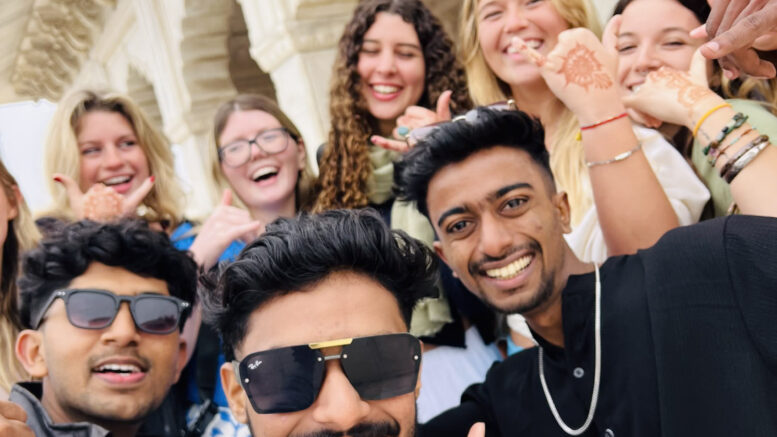By Evelyn Lopez
I heard over and over again that Indians are “poor.” That they “don’t take showers.” That when I went to India for a college study abroad, I “should be scared of getting trafficked.”
FlagSHIP is Flagler College’s high-impact study abroad program designed to push the bounds of students, offering them a transformative real-world experience outside of the classroom. When I signed up for “Diversity and Citizenship in India” last winter, 90% of those around me made vulgar and disrespectful comments about the country, its people and what would happen to me if I traveled there.
The constant commentary and cruel stereotypes made my anxiety grow.
But, it also heightened my curiosity. The closed-minded people attempting to discourage me only made me want to see for myself just what India was like.
Of course, I was still worried.
I knew I would be safe, but I also understood that I was going to be put in uncomfortable situations, surrounded by people speaking a language and practicing customs I didn’t quite understand.
A moment like this took place in Varanasi. I was told not to maintain eye contact with anyone on the streets, as a polite smile to the wrong person would invite “unwanted attention.” Walking up a set of stairs on the Ganges River, I noticed a group of women all holding small babies and empty baby bottles. My eyes must have lingered too long — or perhaps the sight of seven white American girls was enough for them.
I can still feel the woman’s breath on my shoulder, pleading in an unfamiliar language that needed no translation. I can still feel the weight of the baby’s head against my chest as she waved the bottle in my face, presenting the small child to me as if to say, “you are the only one that can save him.”
I looked away and I felt like a coward as they trailed us for over half a mile.
This moment taught me that it is important to look at life through a different lens now and again. Yes, there is hardship in India, as there is in many countries. It is so much more than what you hear, and no ignorant meme or comment could capture the true essence of this woman’s situation.
I am glad I didn’t let people talk me out of going on this trip. Taking that 18-hour flight only reinforced the importance of understanding and appreciating other cultures, and overall changed my perception on what it means to be human, to suffer.
India was full of life and light. I will never forget the beautiful stories that our tour guide, Ajay Singh, told as we watched the sunrise over the Ganga. I couldn’t possibly forget that small boy I met in Bodh Gaya at the Mahabodhi Temple.
He was no older than 6 years old, no hair on his head and a long orange robe draped around his small body. He shook each of our hands individually, asked each of our names and repeated them back to us, retrying each time he mispronounced them.
Today when I think of that smiling boy who, despite his age and language barrier, took the time to learn and pronounce my name, I feel comfort.
On this trip I took part in rituals and blessings involving flower offerings soaked in milk and butter hung around my neck. I learned the story of Buddha, meditated at ancient religious sites. I even got a traditional tribal tattoo on my left shoulder by a man named Amit who told me stories of the Gond tribes while their traditional music played over the vibrating tattoo gun.
Like most people, “travel the world” is on my bucket list. However, until given the opportunity to study abroad through the FlagSHIP program here, I never really thought I would be able to walk through the streets of India.
Now that I have, the more things I saw, people I met and memories I made, the angrier I was about people making judgements and enforcing brutal stereotypes about India.
Every place has its own set of problems: political, economic, environmental. But at the end of the day, it is the spirit of the people that make the country, not its statistics or its stereotypes.
I come back to Flagler thinking about India and believing that we really need to open our minds, and not be so quick to enforce such negative stereotypes about countries or people we’ve never taken the time to visit.



Be the first to comment on "Beyond the stereotypes: Experiencing India firsthand"